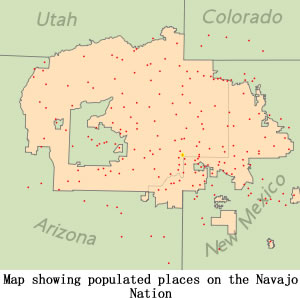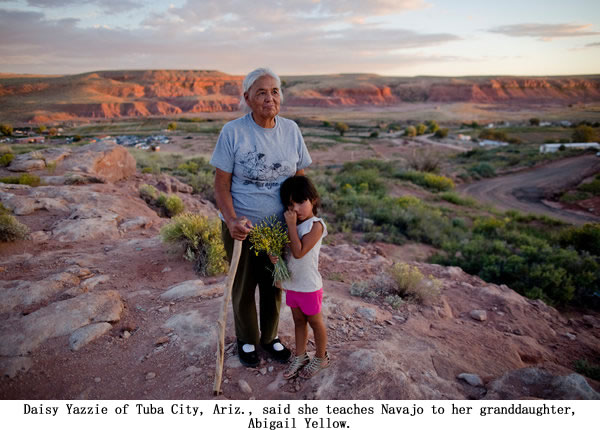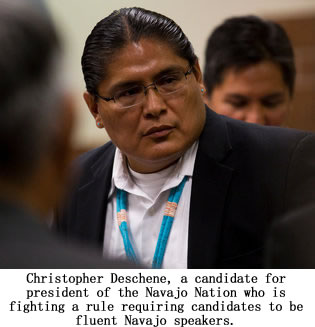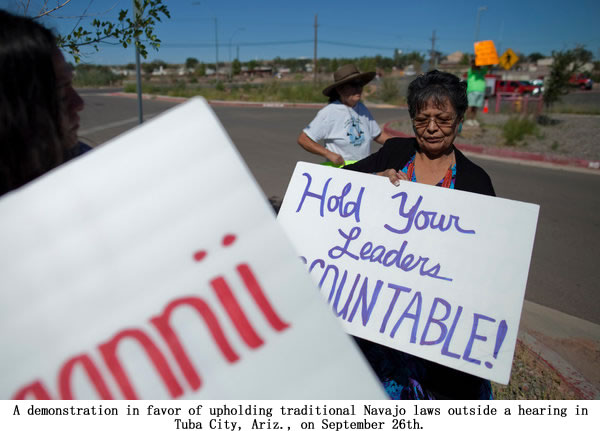 |
Canku Ota
|
 |
|
(Many Paths)
|
||
|
An Online Newsletter
Celebrating Native America
|
||
|
December 2014 - Volume
12 Number 12
January 2015 - Volume 13 Number 1 |
||
|
|
||
|
A Question Of Fluency
On The Navajo Nation
|
||
|
by Wyatt Orme - High
Country News
|
||
|
credits: All photos by
Nick Cote for The New York Times
|
|
A cultural debate leaves the presidency in limbo.
Several days after Election Day, Janene Yazzie sat in the sand with her 3-and-a-half-month-old daughter, Seleste, between the towering red rocks outside Lupton, Arizona, on the Navajo Nation. Her husband, Kern, their 5-year-old son, and her friend, Kim Smith, the self-titled "responsible auntie," took turns firing a .22 at a target propped up by a soda can several hundred yards away. The group was enjoying a respite from tribal politics. On Nov. 4, Navajo voters at the polls had been instructed not to select a president. Though candidate Chris Deschene's name was on the ballot, he had been disqualified for not speaking Navajo fluently, a formal requirement for office. A special presidential election was planned, but had not yet been scheduled. Both Smith, 30, and Yazzie, 27, who are community organizers, fully support the fluency requirement. "I don't think it is radical to require the president of our tribal nation (to) understand the language of the people he's aspiring to lead," Yazzie said, as Smith took aim at the target.
As Smith, Yazzie and others see it, Navajo leaders should have a deep understanding of the tribe's unique traditions and values. Yazzie is tired of hearing that English is as relevant as Navajo. "We don't have problems with our communication with Washington, or the state, or the feds," she said. "We have problems with the communication … to our own communities."
|
 |
|
|
||
|
|
||
| Canku Ota is a free Newsletter celebrating Native America, its traditions and accomplishments . We do not provide subscriber or visitor names to anyone. Some articles presented in Canku Ota may contain copyright material. We have received appropriate permissions for republishing any articles. Material appearing here is distributed without profit or monetary gain to those who have expressed an interest. This is in accordance with Title 17 U.S.C. Section 107. | ||
|
Canku Ota is a copyright ©
2000 - 2014 of Vicki Williams Barry and Paul Barry.
|
||
 |
 |
|
|
The "Canku
Ota - A Newsletter Celebrating Native America" web site and
its design is the
|
||
|
Copyright ©
1999 - 2014 of Paul C. Barry.
|
||
|
All Rights Reserved.
|
||

 The
tribe lacks any legal precedent for determining language fluency,
and the months of procedural drama left many feeling disenfranchised.
The controversy, however, was more than an institutional debacle,
as voters found themselves in a fierce debate over cultural identity
and ideal leadership. Fluency is steadily declining as more and
more Navajos leave the reservation. Deschene, a well-educated 43-year-old
former Marine, was popular with many voters, especially younger
ones, eager to abandon the tribe's old guard. His opponents, though,
found the language question insurmountable.
The
tribe lacks any legal precedent for determining language fluency,
and the months of procedural drama left many feeling disenfranchised.
The controversy, however, was more than an institutional debacle,
as voters found themselves in a fierce debate over cultural identity
and ideal leadership. Fluency is steadily declining as more and
more Navajos leave the reservation. Deschene, a well-educated 43-year-old
former Marine, was popular with many voters, especially younger
ones, eager to abandon the tribe's old guard. His opponents, though,
found the language question insurmountable.